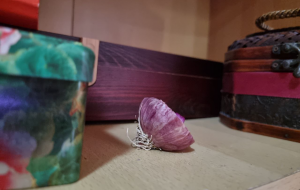Top image: RICE file photo
If someone claims they “prefer not to say” if they’re vaccinated or not, you might have an anti-vaxxer in front of you.
After all, anyone fully vaccinated against Covid-19 wouldn’t hesitate to seize the opportunity to go on a spiel about the experience. Sore arms, sweltering fevers, drug-induced naps — it’s all anyone would talk about in Zoom meetings, Slack chats and Instagram stories (complete with a #IGotMyShot sticker) for weeks.
ADVERTISEMENT
Anti-vaxxers, on the other hand, aren’t as willing to share their experiences. What these tin hatters do instead: share opinions about the supposed evils of the vaccine that, frankly, nobody asked for.
Which is fine, if they’re talking to a mirror. However, during the pandemic, and especially as Singapore moves to reopen, anti-vaxxers get a bad rep for delaying efforts towards a new normal.
In hopes of understanding what exactly goes on underneath their tinfoil hats, I joined several local anti-vaccine groups on Telegram. After all, you can’t claim to truly understand someone without walking a mile in their shoes. Even if their shoes are full of logical holes.
Not all the anti-vaxxers in these groups are boomers: as it stands, I’ve met my fair share of anti-vaxxers under 35, some as young as 16. Considering how boomers tend to be synonymous with ‘naive’, ‘gullible’ and ‘outdated’, the last I expected to find within the group were young digital natives.
With all due respect, I’d assumed they’d be able to discern fact from fantastical fiction.
After spending more than enough time lurking among them and their frankly ridiculous theories, here’s a guide to the types of Singaporeans you’d find inside these anti-vaccine groups.
And because we’re a responsible publication, we had Dr Leong Hoe Nam, an Infectious Disease Specialist at the Rophi Clinic at Mount Elizabeth Novena Hospital, give us a lowdown on why none of them holds water.
Type 1: The ‘Wait and See First’
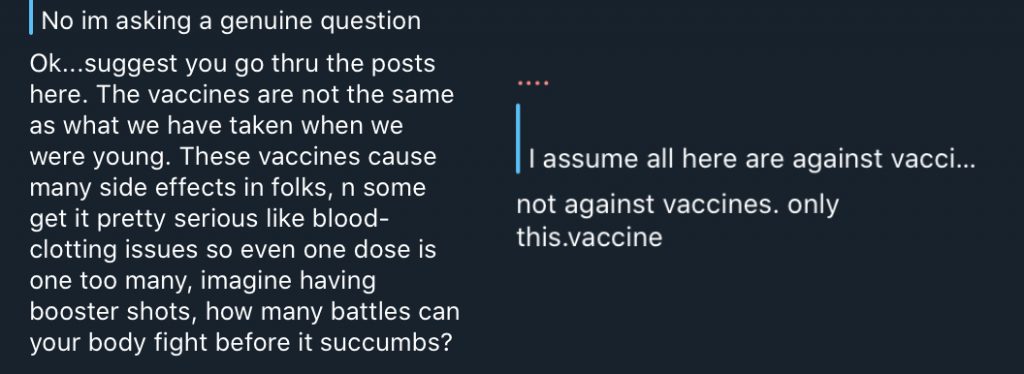
These Singaporeans aren’t necessarily anti-vaxxers, in the sense that they’re not dead set against taking vaccines, just that they don’t want to take it right now. Their hesitancy stems from the speed at which the vaccine was developed — slightly under a year — which makes them think “cannot be“. Something had to be compromised during the vaccine’s development, they say.
Despite repeated reassurance from various health organisations, they’re worried that there might be long-term side effects not known for now due to the short testing period. The idea of potential infertility, degradation of organs over time, or even reduced cognitive function in youths and young adults plagues these folks with fear.
The fact that vaccinated folks can still get infected, even though their symptoms are much milder, is enough to convince them that the vaccine at this stage is completely useless. If it’s not 100 per cent, they don’t want it.
Fact check:
As Covid-19 becomes endemic in Singapore, there will be people who will inevitably get infected. Dr Leong points out how, with the vaccine, the risk of spread is significantly lowered by 92 per cent to the colleagues in the same office and by 54 per cent to your family members.
ADVERTISEMENT
And yes, the vaccines are safe. They’re made with the same methods and precautions as with other vaccines, from their developmental stage to their clinical trials. The emergency use of the Covid-19 vaccines has also been authorised by the World Health Organisation.
With regards to long term side effects, Dr Leong explained how the vaccine — which imitates an infection — only remains in the body for a couple of days before the imitation infection goes away. Side effects would typically appear within two to three months, though most appear within the first 14 days. After which, no other side effects will occur.
Also, the mRNA vaccine has been tested on humans since 2010. So if there were any long term side effects, they would’ve shown up by now.
Type 2: The ‘It’s Just the Flu’
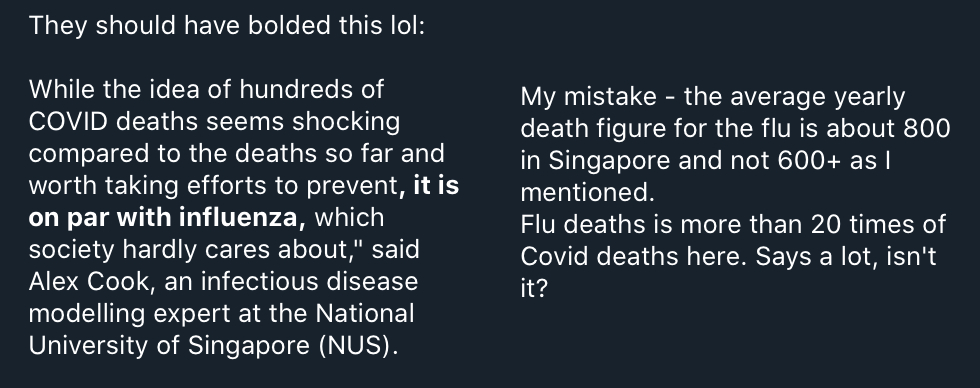
These are the people who believe Covid-19 is no different from the common cold. Or rather, the flu is even more potent than Covid-19, just going by the number of fatalities. As such, they’re unable to understand why there’s such an “overreaction” to the way everyone treats Covid-19.
Worst still are those who think Covid-19 can be cured with Ivermectin — a drug used to treat parasite infections in humans such as scabies, though it’s more commonly used as a deworming drug for animals like cows and horses. These vaccine neighsayers even share screenshots and links to so-called articles about other countries using Ivermectin to treat Covid-19 to back up their point.
Fact check:
According to studies published in The BMJ, those infected with Covid-19 were five times more likely to die than those with the flu. They were also four times more likely to require breathing machines, and 2.5 times more likely to be admitted into the intensive care unit.
The death rate? 18.5 per cent among Covid-19, compared to the 5.3 per cent among flu patients. As there is no effective medication against Covid-19 — unlike the oral outpatient medication available to flu patients — Dr Leong stresses the importance of prevention by getting vaccinated.
And as much as we’d all like a miracle drug, Ivermectin ain’t it. As it is, Ivermectin isn’t accepted as a treatment for the virus due to ethical concerns, and remains both unapproved and unproven.
Dr Leong puts it bluntly: if Ivermectin truly worked, the owners of the drug Merck & Co. would’ve released it and long reaped the profits.
Type 3: The Magneto Wannabes
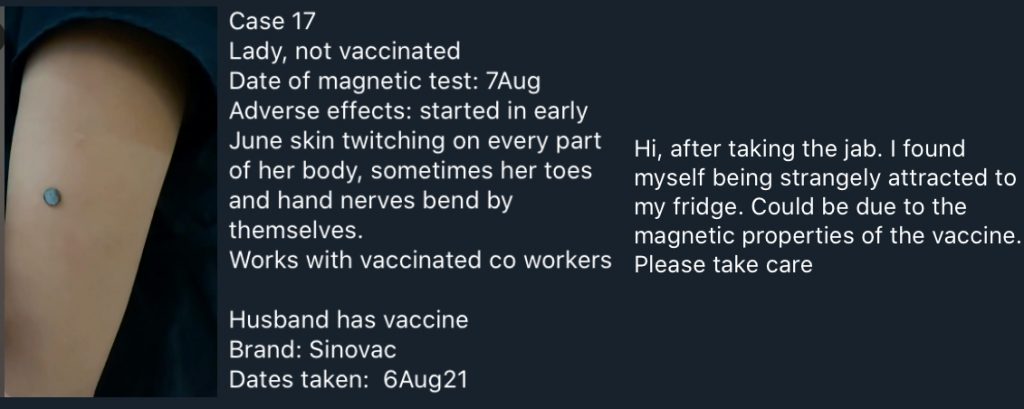
Apparently, the vaccine will make people magnetic. Apparently. Or so the conspiracists claim.
ADVERTISEMENT
So dedicated are they in their belief that they created a separate Telegram group just to document all instances of people who experience “magnetism” post-vaccine. These photos and videos all show people who’ve had spoons, coins and other metal objects stick to their skin.
One user even claimed to experience unusual attraction to their fridge shortly after his injection. As you do.
They attribute their newfound magnetic ability to graphene oxide that was supposedly injected into them during the vaccination process.
Fact check:
Pfizer-BioNTech has confirmed that graphene oxide — a single-atomic layered material made through the oxidization of graphite — is not used in the manufacture of their vaccines. The substance is not found in the ingredients lists of any other vaccine either.
As to why things cling on, Dr Leong kindly demonstrates by sticking a paper clip to his forehead after a long workday.
“Oil from my face makes me magnetic. My wife calls me kuali face for a reason,” he laughs. The sebum produced by our pores is what makes us sticky, hence “magnetic”.
“This is not magnetism — it’s an oily face.”
Type 4: The Zombie Movie Enthusiasts
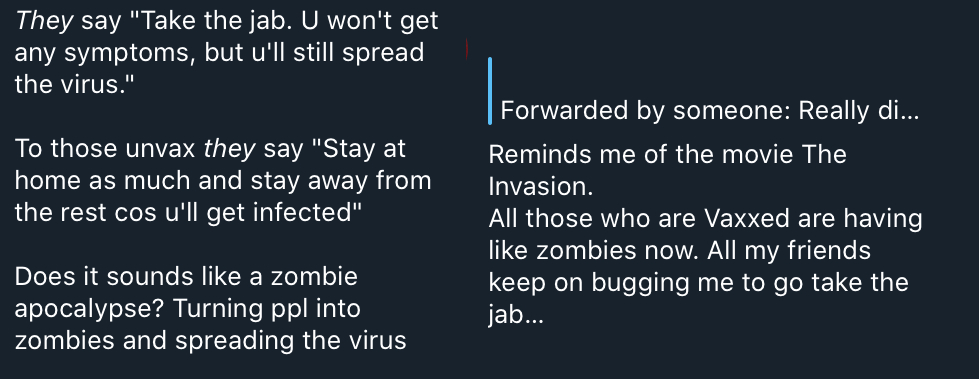
These anti-vaxxers think they’re the last ones standing against a wave of vaccinated zombies.
Day and night, they’re hounded by vaccinated acquaintances telling them to get their shots. For the average conspiracist to be surrounded by a large group of people telling them the same thing is nothing short of nightmare fuel. As such, they believe the vaccine brainwashed them, causing them to tune in to a hivemind.
Fact check:
I Am Legend, the movie anti-vaxxers cite as a supposed documentary for what happened post-vaccine, is fictional. The plot of the fictional movie also had nothing to do with vaccines. Instead, the fictional zombie infection was caused by a fictional virus.
At this point, I could feel Dr Leong’s disappointment radiating from across the screen.
“There is no way to argue against nonsense or a fool. You will never win the argument,” he replied. “I’m disappointed that human beings are more charmed by exciting tantalizing falsehoods than true boring scientific facts.
“It’s one thing to be thrilled by sci-fi and alternative conspiracy theories that are best viewed in an armchair at home or on Netflix, but quite another to live through it.”
Type 5: The Futurama
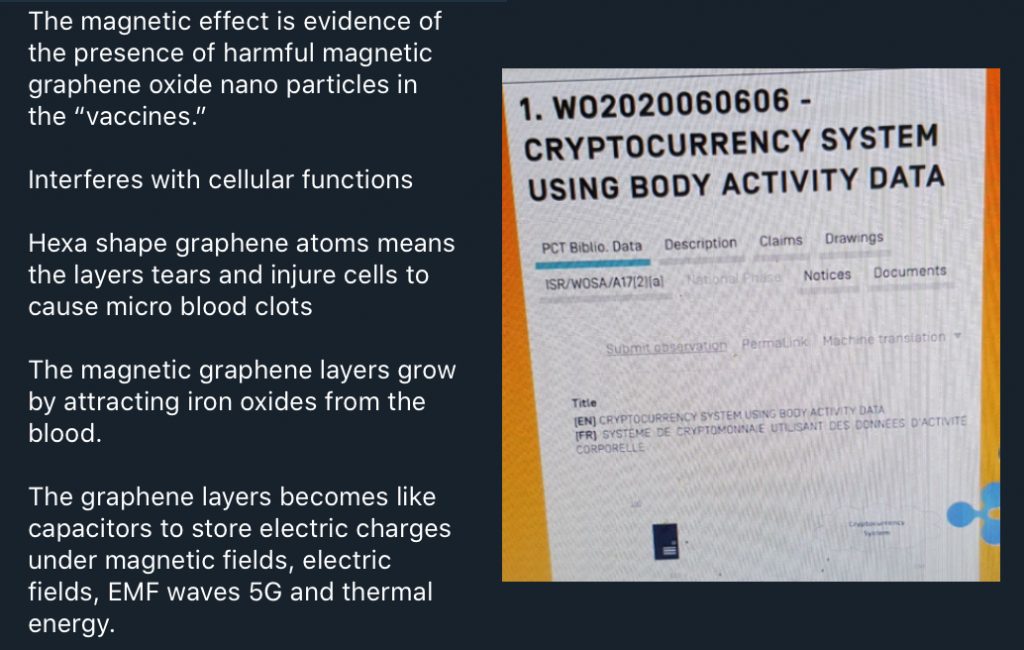
Perhaps the most common of the tin foil hat folks. This group genuinely believes the vaccine hides a tracking device, similar to a pet’s microchips.
They claim the microchips cause vaccinated folks to emit their own 5G signal, which powerful bodies use to gather personal information and important data. For those who are particularly protective of their private information, this “fact” comes across as a complete disregard for their privacy and human right. All while conveniently forgetting that smartphones exist.
These 5G signals also allow shady parties to farm Bitcoins based on vaccinated people’s movements, or so they’re deeply convinced.
Fact check:
It’s been debunked countless times — the vaccine does not inject microchips into the human body. That photo of a microchip inside the tip of a syringe needle? It came from a figure in a study about microtechnology, which has nothing to do with the vaccine itself.
Type 6: The Nonbelievers
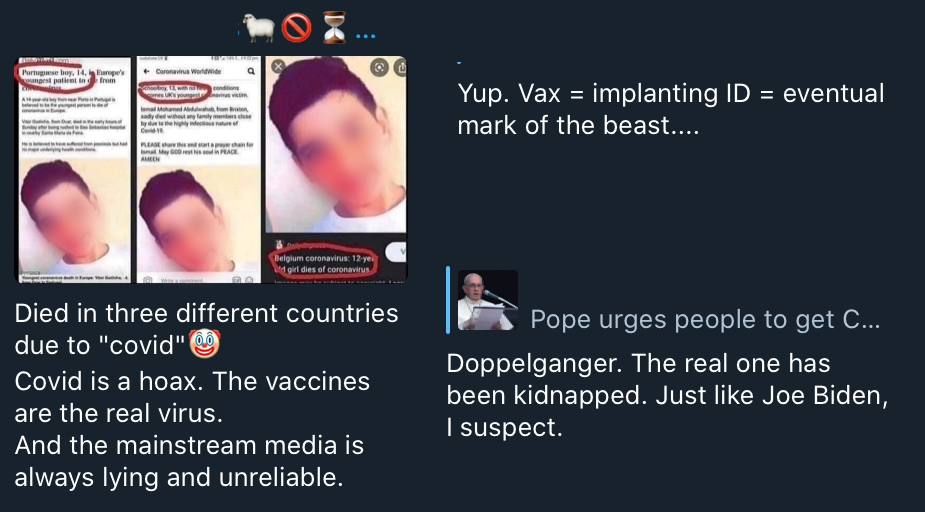
Perhaps the most worrying of the lot, this group of anti-vaxxers don’t believe the coronavirus exists at all. Similar to Benjamin Glynn, the “Truther” who gave us one of the most absurd rants in court and on Twitter ever, these people have “done their research” and decided that governmental bodies across the globe are fearmongering through “corona terrorism”.
Some even claim notable figures, such as US President Joe Biden and the Pope, have been kidnapped and replaced by doppelgangers. Others swear the vaccine is actually the work of the devil and would leave people with the mark of the beast.
Fact check:
Unfortunately for all of us, the coronavirus pandemic is very much real. It’s a global outbreak caused by the SARS-CoV2 that has resulted in the deaths of 4.51 million people at the time of writing.
Claiming the coronavirus doesn’t exist at all would be making a mockery of the people who had lost their lives and livelihoods to the pandemic.
Tinhat Origins
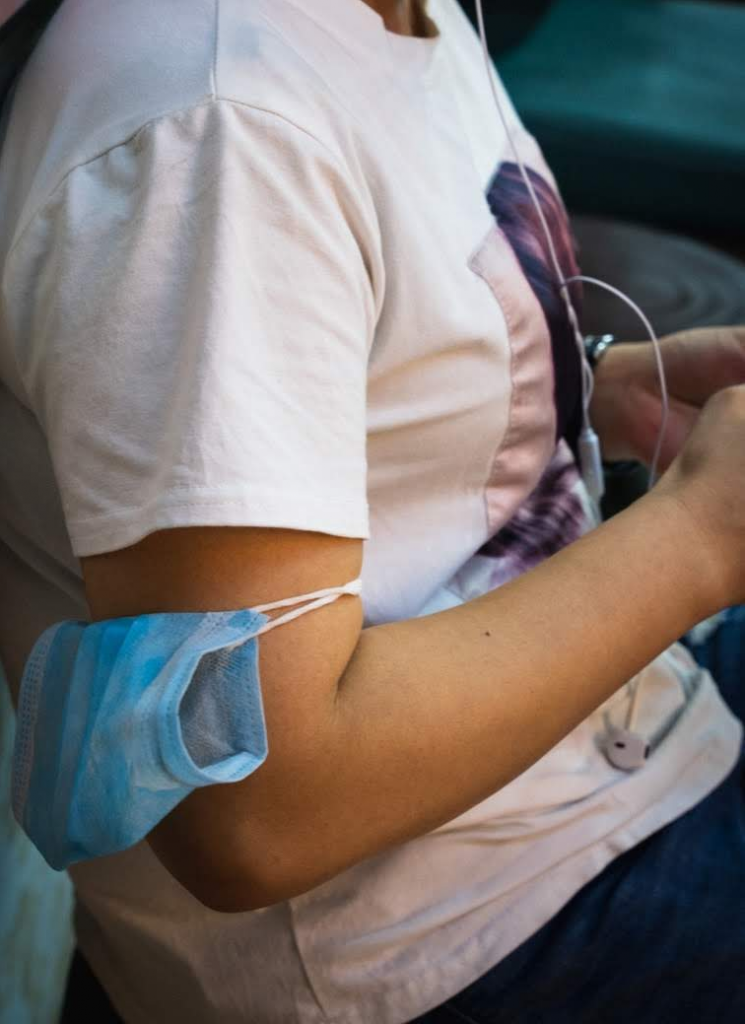
Considering the level of imagination that goes on between anti-vaxxers, one big question remains: How did they even come about?
Dr Loh Jiashen, an infectious diseases specialist at Farrer Park Hospital, broke it down into three main causes.
The first cause, he shared, was the lack of consistency when it came to the iteration of the vaccine. Earlier in January this year, when the vaccine was first introduced, those with a history of anaphylaxis or severe allergic reactions were told they should not receive the vaccine. This came after four individuals suffered from anaphylaxis post-jab.
This restriction was later lifted in June, though a small group with a history of anaphylaxis or allergic reactions to other vaccines were still not eligible.
By that point, these conspiracists, many of whom were already hesitant to trust the vaccine, took the change in treatment as an indication that the vaccine wasn’t safe.
The second cause: the ability to air words and opinions without consequences. In this age, social media has gone beyond a platform to connect with friends to be a place where anyone and everyone can post just about anything.
Unfortunately, that also means anyone can spread false information as much as they want without having to be held accountable for what they post. Despite Facebook and Google’s efforts at cracking down on misinformation, the damage has already been done.
Dr Loh compares it to The Emperor’s New Clothes, a child’s folktale about the dangers that come with the lack of criticism and the lack of condemnation of what’s obviously wrong. In the same vein, anti-vaxxers needed to be nipped in the bud the moment they started showing signs of hesitancy.
The last, and perhaps the most worrying cause, are anti-vaxxers’ inability to think critically. To Dr Loh, this was the biggest problem — despite being educated, not everyone is digitally literate.
This is especially true among the older generation. As Singapore makes its aggressive progress to being a smart nation, the older generation found themselves thrust into the digital world without developing proper digital literacy, and thus aren’t as capable when it comes to discerning facts from fiction. It’s also why they fall prey to online scams so easily.
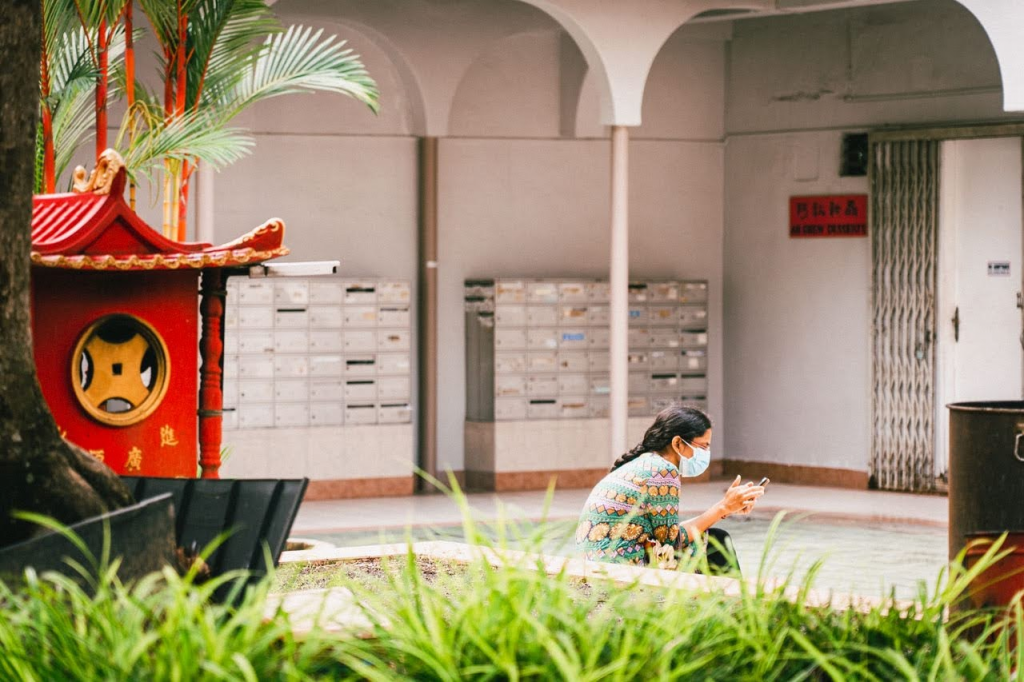
While I can’t say I agree with any of the anti-vaxxers, it’s easy to see within the chatter of the group where their fears come from, and how the chat functions as an echo chamber, amplifying every trumped-up story.
When over a thousand messages get fired per hour (this, even with a forced five-minute cool-down between messages), any “fact”, “article” or “speculation” easily spirals into a rabbit hole of its own.
With an onslaught of misinformation and fake news, the group functions to encourage the members’ confirmation bias, pulling them further away from the truth. In an environment as volatile as today, it’s understandable to have an emotional tendency for one answer over the other, even before doing any form of research. The danger comes with only looking for the evidence to back up the original bias.
Locals, particularly those jaded by the restrictive media culture here, already take news from mainstream media with a huge spoonful of salt. Alternative media sites, forums and chat groups are prevalent, and they can easily sway the opinions of those who already don’t trust official news sources.
Rather than forcefully try to get them back on the right path, it’s even more important to prevent more people from becoming anti-vaxxers. This, by understanding where anti-vaxxers are coming from and communicating in a way that reaches those straddling the grey zone of uncertainty.
Like conspiracy theories, there’s no shortage of credible information from legitimate experts and doctors. They just need someone they trust to nudge them there.






